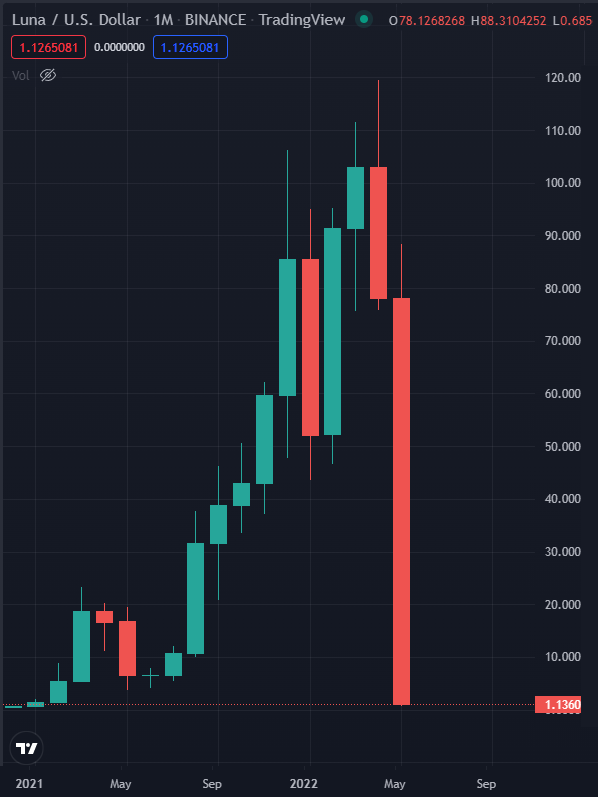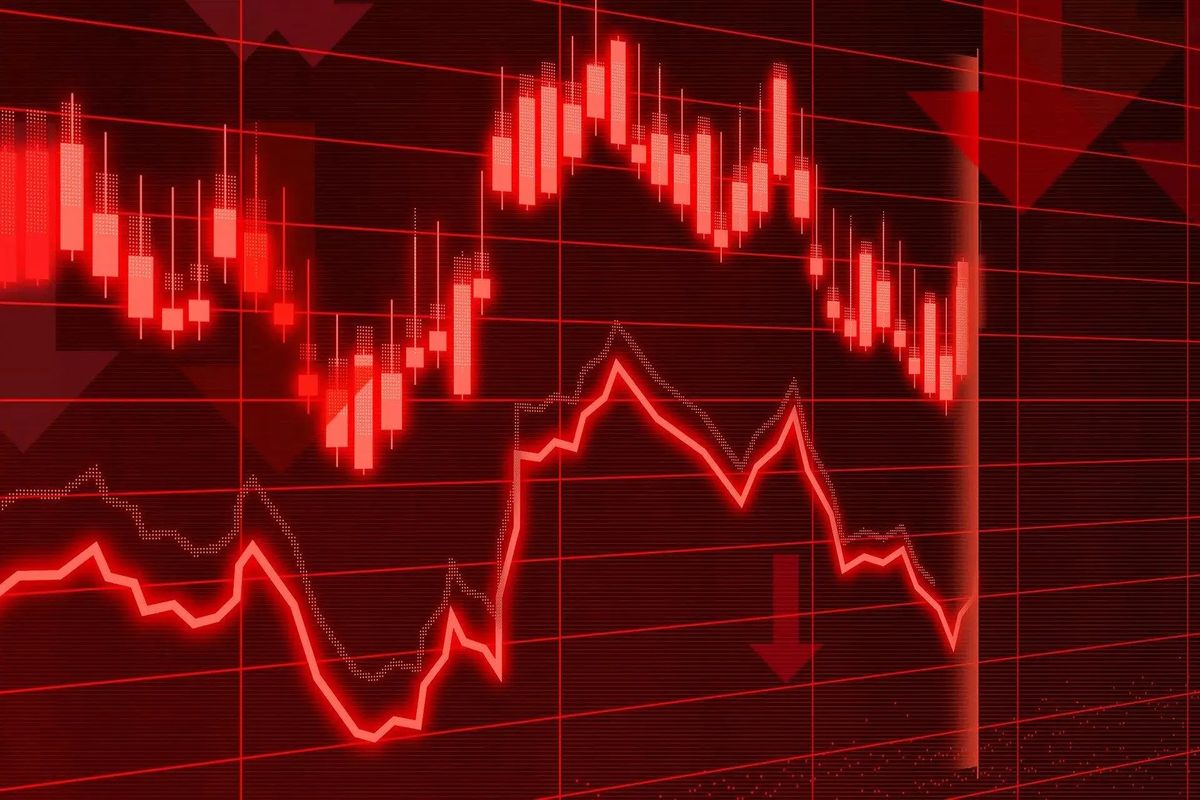Crypto investors have never even considered asking whether TerraUSD (UST) (Terra LUNA) would reach $1 first. On May 11, this question became the talk of the general crypto universe as the Terra ecosystem imploded.
The algorithmic stablecoin UST abruptly lost its dollar peg, plunging to a low of nearly $0.30. At the time, Terraform Labs co-founder Do Kwon went on Twitter to share his rescue plan.
Concurrently, the value of the sister token Luna, which was once a top-10 crypto project based on its market cap, lost 98% to trade around $0.84, based on CoinMarketCap data. Notably, LUNA was trading at over $120 in early April.
Amid all the chaos, some analysts explained the theoretical underpinnings of algorithmic stablecoins and why they are highly risky. Remember the hype surrounding Luna Foundation Guard’s Bitcoin purchases? That appears to be one of the largest red flags that came up in this market.
Related:Tower Finance Launches Algorithmic Stablecoin
For now, the Terra (LUNA) holders are 96% poorer than what they were 7 days ago. In the last 24 hours, the price of LUNA lost nearly 90%, based on data from CoinMarketCap. Terra’s ranking has also plunged to 37th in terms of market capitalization.

The LUNA crypto token dropped from $120 to $0.68, a 99.5% correction, with a 98% loss recorded within a day in a black swan event. At the same time, the stock market corrected with the SPX moving down below the 4,000 level for the first time since May last year.
Bitcoin plunged to below $28,000 for the first time since January 2021. With altcoins mostly correlated to Bitcoin’s strength and weakness, the crypto sector’s correlation to the S&P 500, in general, reached a 17-month high in March 2022. The drops indicate that Bitcoin and the altcoins are yet to decouple from the traditional stock markets.
The latest drop in price and ranking is quite shocking since it used to feature in the top 10 around 8 days ago. Also, TerraUS (UST) has lost over 49% in the past seven days, of which 44% was lost in the past 24 hours. UST ranking has also plunged to 15, below Shiba Inu.
Reasons for the LUNA crash are believed to be deeper than it is being highlighted, and they are a major warning for investors on crypto price volatility.
What Is Terra Luna?
Terra is a blockchain protocol that is designed to support price-stable global payment networks using stablecoins that are backed by fiat currency. Based on its white paper, it integrates the price stability and mass adoption of fiat currencies with the censorship-resistance of Bitcoin (BTC) and provides speedy and low-cost transactions.
The LUNA token and UST are mutually connected since the Terra ecosystem’s success is mainly dependent on the adoption of UST as a stablecoin. LUNA is seen to invest in UST and it is burned as demand for UST grows. On the flip side, in case UST is viewed as unstable, the value of LUNA drops.
Related: Elastic Supply Tokens, Are They The Future Of Stablecoins in 2021?
Both TerraUSD (UST) and Terra (LUNA) were developed by Terraform Labs, launched in 2018, and headquartered in Seoul, South Korea. At the center of this debacle is Terra Labs CEO Do Kwon. His idea was to develop an ‘algorithmic stablecoin’ where LUNA is burnt to mint UST to stabilize it when it loses its 1:1 peg to the dollar.
The strategy is different from the way other stable coins like USD Coin (USDC) and Tether (USDT) operate. For instance, in case UST hit 0.99, a small amount of LUNA is burnt, and when it hits 1.01, a small amount of UST gets burned. Everything was working until it stopped this week.
It has now been suggested that Do Kwon has been behind a failed stablecoin project in the past, known as Basis Cash. For now, nobody knows why UST lost its peg, and Do Kwon is yet to explain to investors and the general public.
There is even a rumor that it was a coordinated attack to exploit Terra and result in a Bitcoin crash so that the whales would buy Bitcoin at a cheap level.
Why Did Terra LUNA and UST Crash?
The debacle began when Terra’s algorithmic-based Stablecoins TerraUSD which is pegged against the dollar, started plunging. Binance crypto exchange suspended the withdrawal of LUNA and UST resulting in a cascading effect on the prices of these cryptos.
The current issue appears to have highlighted the challenge that affects algorithmic-based stablecoins. COO and Co-founder of EasyFi Network told FE Online, Anshul Dhir, said:
“Terra’s fall could be attributed to large scale selloffs of the LUNA tokens owing to the reported “de-peg” of the algorithmic stable coin. This selloff must have also got exacerbated with the market already being in a largely bearish mode.”
Based on the current reports, the team that manages UST and LUNA will need to prepare proactively to strongly defend the stability of the $UST peg under the current macro conditions. Dhir added:
“It’s now a wait and watch to see how the markets progressively stabilize.”
Some of the analysts say that Terra LUNA and UST crashed since the 30-year-old Do Kwon has an unappealing reputation on Twitter for arrogance. His arrogance might have resulted in a personal attack that affected the Terra ecosystem.
Charles Hoskinson, the Cardano founder put forward a theory on this matter, although he later deleted that tweet. He had tweeted that a huge institution borrowed 100,000 Bitcoin from the Gemini exchange. Then, they exchanged a huge amount of the BTC for UST over the counter with Do Kwon at a discount. He agreed and lowered the UST liquidity.
The institution then supposedly dumped massive amounts of UST and BTC on the market resulting in a liquidation cascade of leveraged longs, slippage, and panic selling by the unsuspecting investors. Investors sold their LUNA holdings and unstaked their UST to sell it.
The tweet claimed that Terra was a Ponzi scheme that never had enough BTC reserves on hand to prevent the crash. None of these allegations are validated and Gemini denied issuing such a loan. Nevertheless, market manipulation is a common occurrence in all financial markets.
Hoskinson (@IOHK_Charles) later said that even if the Gemini tweet is accurate, someone undoubtedly launched an attack on Terra. For now, the attacker is still unknown, and social media is dominated by speculation and a variety of strange explanations.
Are The Algorithm-Based Stablecoins Unstable?
Based on the analysis by Dhir, algorithmic stablecoins are still at the evolution stage and for now, they are just mere experiments. Most of these projects have been experimenting with this type of stablecoins. He added:
“Hence, there is an intrinsic risk associated with it; anyone who invests or has invested in them should not blame the project founders or the industry.”
The risks that come with these experiments have to be thoroughly understood before putting any money into them. The risk with these experiments affects the founders and users who choose to participate in the program. Dhir explained:
“Experimental algorithmic stable coins are volatile and it is believed that it will take some time to find a good algorithmic stable coin. Over a while, such programmable money should be possible which ultimately the end goal of decentralized finance is.”
Investors Narrate How The Ordeal Affected Them
The latest crash means that its market cap plunged from around $40 billion to only $500 million, resulting in unexpected losses for investors. One member of the r/TerraLuna sub-Reddit wrote:
“I lost all my life savings. Had bought Luna at $85, not sure what to do.”
Another user wrote that they had lost $15,000 after they failed to sell their crypto for a significant profit when it was trading at over $100 in April. Reddit user No-Forever commented:
“I should’ve cashed out when it was $100, then I would have been up to $25,000. But I got greedy hoping to get more money so I can at least afford a downpayment for a house for my family. I guess no house and savings then.”
Moderators of this forum pinned a post with helpline numbers to the top of the page after many users complained about the consequences of the latest crash.
“I lost over $450,000, I cannot pay the bank. I will lose my home soon. I’ll become homeless.”
Related:Ruud Feltkamp CEO of CryptoHopper Talks to us About Flash Crashes and More
Binance suspended withdrawals on Terra (LUNA) network at some point, which meant that even the investors who wanted to sell could not do it. The exchange cited:
“High volume of pending withdrawal transactions… caused by network slowness and congestion”.

This Terra crash comes amid a downtrend for the general crypto market that has seen bitcoin lose over 50% since its all-time high of around $69,000 recorded in November 2021. But, LUNA’s woes have been compounded by issues with Terra’s dollar-pegged UST stablecoin. LUNA has imploded in May 2022.
Earlier in the week, UST decoupled from the dollar and plummeted to lows of $0.29. Currently, the Luna Foundation Guard (LFG) which is the steward for UST is looking to raise at least $1 billion to rescue the algorithmic stablecoin. However, many investors insist that this project is already over.
Kwon, the Terraform Labs founder, tweeted:
“Close to announcing a recovery plan for $UST. Hang tight.”
He also asked for patience from the community:
“I understand the last 72 hours have been extremely tough on all of you – know that I am resolved to work with every one of you to weather this crisis, and we will build our way out of this. The Terra ecosystem is one of the most vibrant in the crypto industry, with hundreds of passionate teams building category-defining applications within… Terra’s return to form will be a sight to behold.”
Will Terra LUNA and UST regain from these steep losses?









